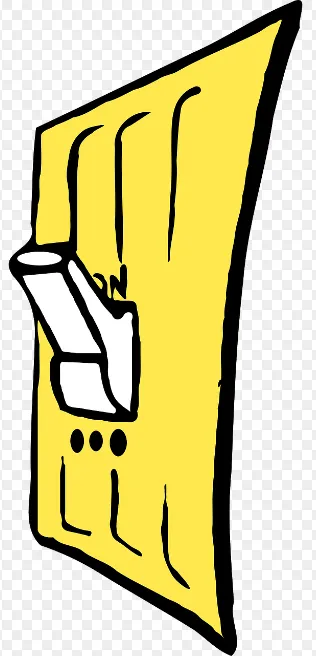
Time to introduce the topic for this week. Electricity! Now your house just isn't the same without electricity for everything from running a fan or AC, to keeping the fridge running, cellphones charged, TV working, computers operational and so much more.
However, not everywhere has the same price for electricity. Not everywhere has electricity that is as reliable as others. In that light this weeks posting topic is about Electricity.
- How reliable is it?
- How expensive is it?
- How difficult is it to get hooked up?
- and how to you try to lower your electric bill.
Of course if you have stories or other information to add I'd love to hear it!
As usual prizes will be very modest ($3HBD for 1st, $2HBD for 2nd, $1HBD for 3rd, and Ecency points for 4th and beyond). Posts are always welcome but prizes will be given out in roughly one weeks time (maybe an extra day if I get lazy). After prizes are given out your welcome to keep on posting about electricity but you won't be eligible to win anything 😁
Any post is eligible to win but only post 300 words or more will be curated and I'm only allowed to curate 2 posts daily with the @hive-pakistan support. Cross posting is welcome but it does have to show up in the #Be Frugal not Stingy community to be eligible also.
This week I'm going to post my "template" as an example.
If your curious about Electrical bills in Canada, or at least my province BC in Canada then keep on reading. Of course your country will differ but here we go.
I'm lucky to live in British Columbia, Canada
In my province we get most of our power from Hydroelectric sources. It feels good to know that the electricity comes from a renewable source. The electricity is also very reliable. 24hr a day power is assumed by everyone and I'll only be without power for maybe 3 or 4 hours once every two or three years. We only have one provider of electricity and that's BC Hydro. Now the name always throws my wife off because she sees "Hydro" and thinks its the water bill.
Nope it is the electric bill and it looks like this:
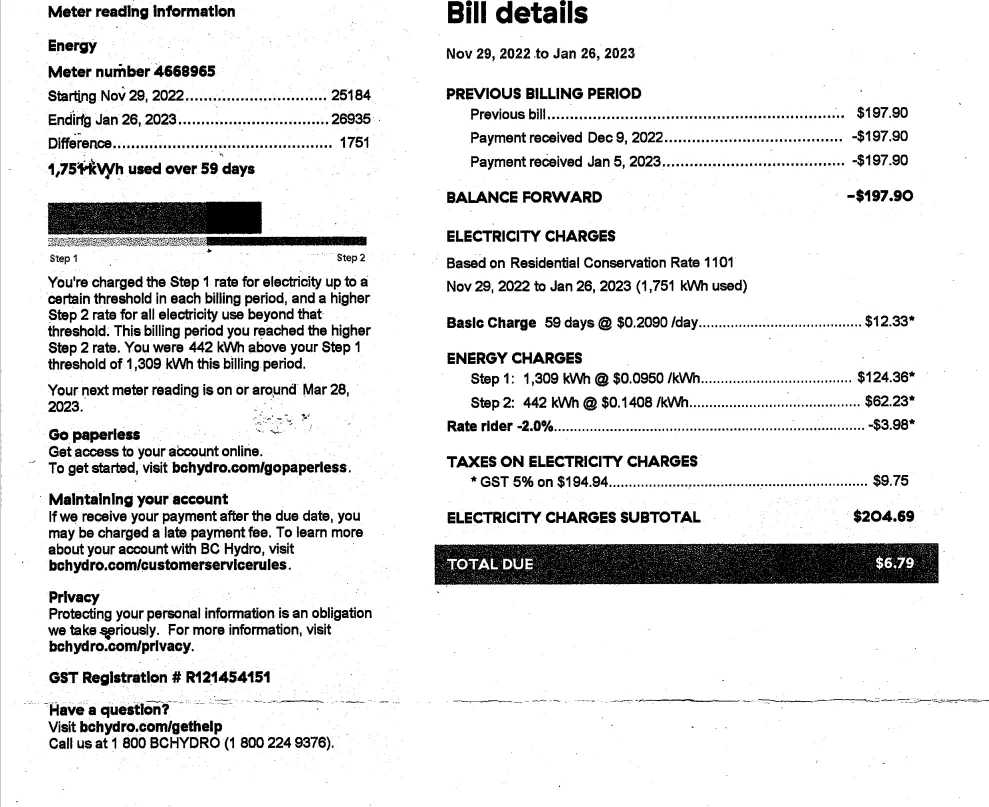
Here are a few take home points from the receipt:
Electricity is billed every two months. That can be annoying because it is hard to remember which months it comes in and it can be an unexpected expense.
There is a basic charge just for having electricity connected to your house of $12.33 bimonthly whether you use electricity or not. Also, you can't just ask them to stop billing if you aren't there. If there is a meter at the house there is a bill to the house. If they shut off the power there is a big reconnection fee later.
There are two rates. A lower initial rate of 9.5 cents/kWh (55 Naira) for low usage and 14.08 cents (80 Naira) for higher usage. There are actually different rates for business and industrial but I'm just focusing on home use here.
We have to pay a 5% tax on our bill which goes to the federal government.
There is a story behind that electric bill.
You will notice that there is a charge of $205 (117,000 Naira for my Nigerian friends).
What is most annoying about that bill is that it is for electricity that I never actually used.
You see I had a rural property where I had people living as caretakers. Unfortunately the caretakers made a significant mess to the property and damaged some of my items there. As a result I had to ask them to leave and had to pay them $8,000 (4.5 Million Naira) to vacate the land.
They were very unhappy about leaving but their contract had ended and I gave one year notice for them to vacate so they didn't have much of a choice.
They could however leave the heat on in the small cabin on the property. Indeed they left the heat on AND the window open AND left a piece of wood over the heater hoping that it would catch fire. They left in September and once November comes the property can be difficult to reach by vehicle because of snow.
Notice the date on the bill? November to January.
When I got the bill I was really unhappy but it was a 2600Km trip to go there and even if I got there I would be unlikely to get to the cabin to turn off the heat and close the window.
Such a horrible waste of energy!
I did call BC Hydro if they could disconnect for the winter. The response:
NO
Well, I could pay a disconnection fee then another reconnection fee when I wanted the power back on. However, the bill for that was far more than the $600 I paid for electricity over the winter months.
Lesson learned. Turn off the electricity before leaving the property!
How to save a little on electricity.
Now I love to save electricity for two reasons:
- It's better for the environment and
- It means more money in my bank each month.
Now there are lots of ways to save a little money on electricity by things like solar charging my cellphones. Unplugging cellphone chargers when not being used. Switching unplugging devices with led lights when not in use.
However, the biggest places to save money are on the big energy wasters in the house.
Example: Instead of having air conditioning for the whole house I only have air conditioning in one room.
But I'd like to show three other areas I'm playing with on how to save money on electricity.
FIRST : Cooking.
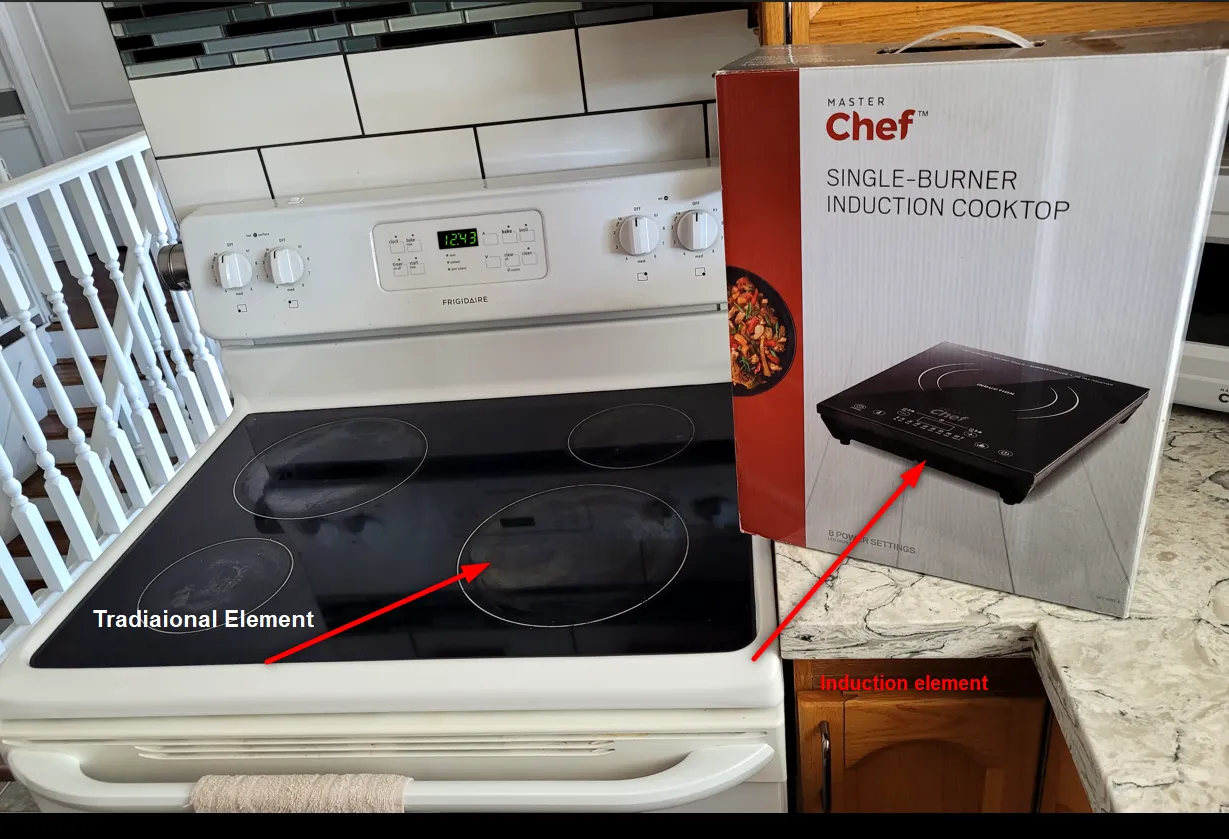
Cooking uses a lot of electricity. By example an LED lighbulb uses about 3W of power while a stove element uses about 1500W or about 500x as much electricity.
Now a traditional stove the element heats up then a pot is placed on top. However, this heat transfer takes time and isn't very precise.
On the induction cooktop the element does NOT heat up but instead it uses magnets to cause the pot to heat up instead. It is faster to get things cooked, more precise in its heating, and it can use up to 50% less electricity for the same cooking!
I'm all about saving 50% on any bill. Especially when its faster and equally convenient.
As you saw Heating uses a lot of energy but then again, so does Cooling. Up next:
SECOND: Refrigeration.
Now most people are used to seeing a big old fridge like this one:
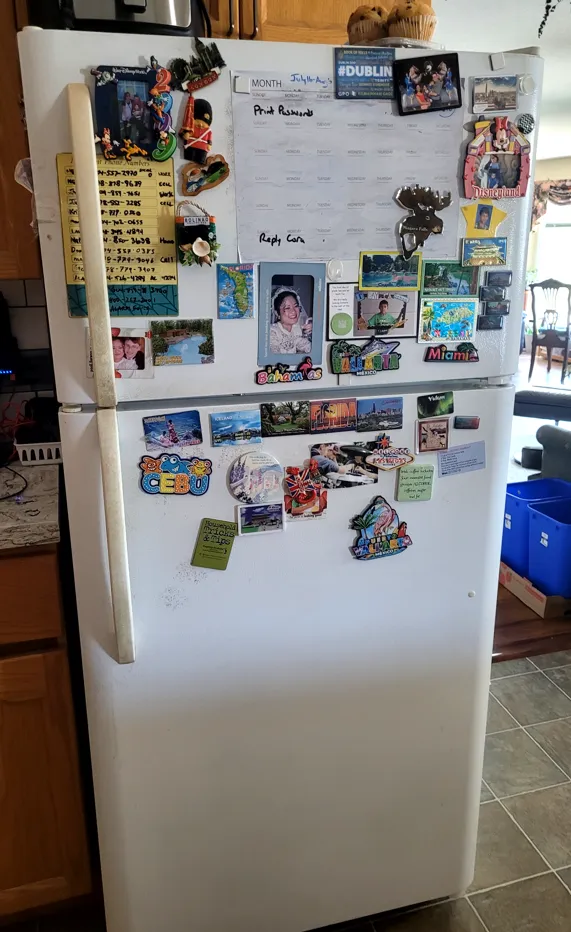
Just open it up and chilled items inside.
Except there is a horrible problem with the design. You see cold air falls and warm air rises. The moment someone opens the door to this fridge all the cold air inside falls to the floor. Once you close the door the fridge senses the warm air and it turns on to replace it.
Every opening and closing of the fridge is more and more energy and money wasted.
So one option is to not store things in the fridge. I like that idea and try hard to dehydrate or preserve things where I can to minimize fridge use. However, that's not really practical for a day to day option.
A second option would be using a fridge (freezer) like this one:
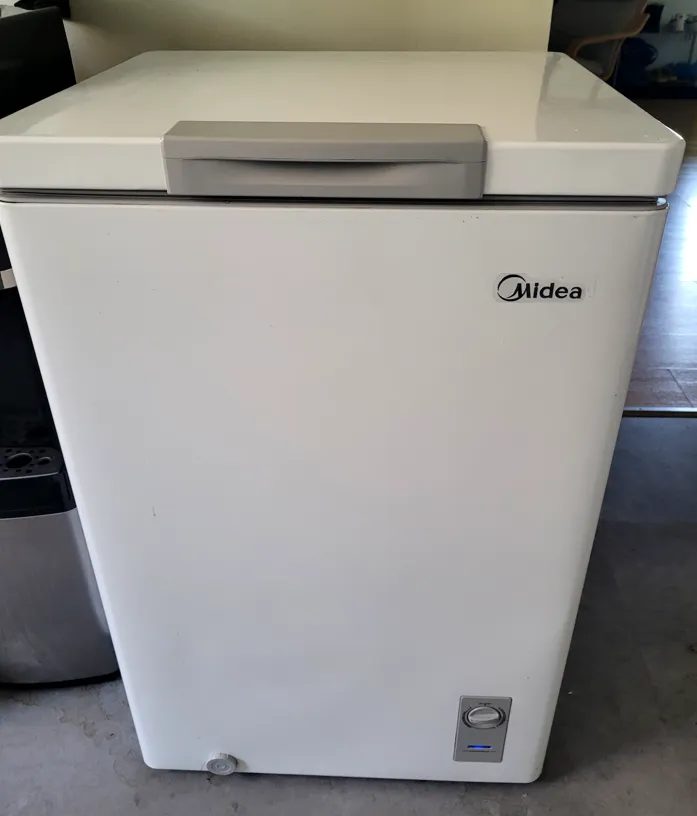
With this design you open the top to get stuff from the fridge. The cold air does NOT escape and it is therefore much more efficient! Now some people claim that it is 90% more efficient. I've monitored it and only found it only 50% more efficient.
True it is a little less convenient to pull things from a fridge of this type but for 50% savings I'm willing to do the work. As a side benefit if there is a power outage things stay cooler longer in this type of fridge.
And I really REALLY love this fridge:
Yes its small and doesn't hold that much. However, it only uses 40W of power when running and doesn't need to run that often because its well insulated. It has precise temperature settings and at -2C it is the perfect temperature for ice cold drinks.
Overall uses less than 10% of the energy of the big fridge. Side bonus its portable so I can use it in the car, at home, or in the cabin on a solar panel.
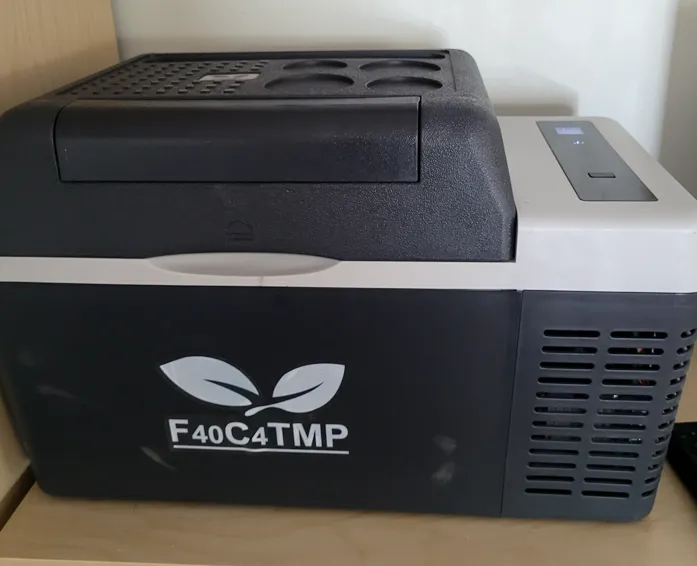
THIRD: Washing and Drying Clothes.
A clothes dryer is a HUGE energy drain. it is not uncommon for some clothes dryer to use 1500-3000W of power and need a special plug because of it. Where possible we try to hang clothes to dry in the sun. If not possible hanging them to dry with a steady breeze from a fan is equally effective but does take longer.
Now there is also the clothes washer. I do have a front load electric clothes washer and we do use it regularly for large loads. It uses a fair amount of electricity and a lot of water. For a large load I'm not overly worried about it.
However, what about those small loads?
For that I hate to use the big machine. Such a waste of power and electricity. In those cases I could wash by hand but that's not much fun and I'm not good at it.
So....
I bought this little machine and I really love it.
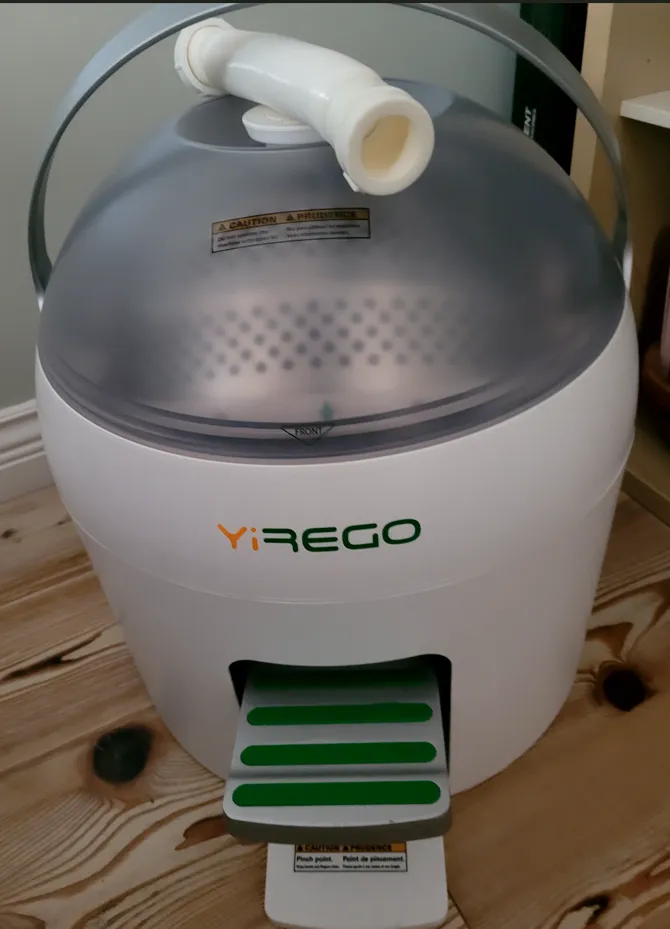
It is a foot powered washing machine that does small loads just like a regular clothes washer except my foot provides the power and I manually add the water. For less than 10L of water I can do a full set of clothes.
It's actually faster to wash the clothes than the regular clothes washer. It is also gentler on the clothes then the washing machine. It uses much less soap as well.
Overall I think it is a cool little device. Efficient and fast...plus I get a little exercise. Or maybe a few steps for my Actifit report.
Sure there are lots of other ways to economize on electricity. I'd love to hear yours.
Hope you enjoyed the post.
Thanks for dropping by.
Hope you join in this weeks discussion topic!